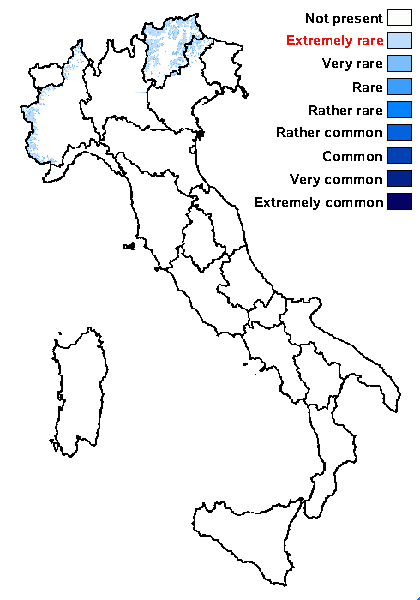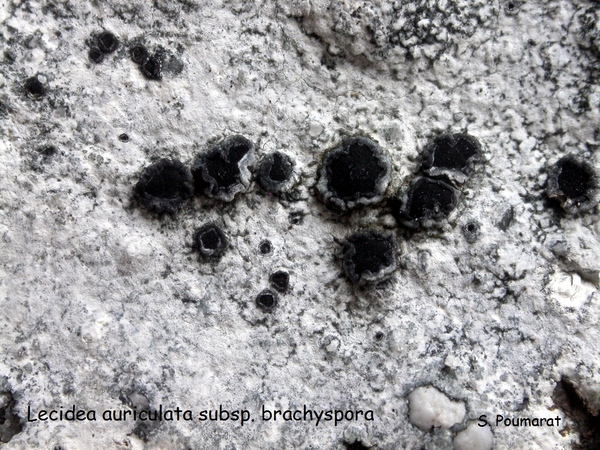Lecidea auriculata subsp. brachyspora Th. Fr.
Lichenogr. Scand., 2: 501, 1874.
Synonyms: Lecidea brachyspora var. dissentiens Bagl. & Carestia?
Distribution: N - Ven, TAA, Piem (Isocrono & al. 2004, 2006).
Description: Thallus crustose, episubstratic, cracked-areolate, white to grey-white, usually without a distinct prothallus, more rarely poorly developed and hardly evident. Medulla I+ violet-blue. Apothecia lecideine, black, adnate and slightly constricted at base, l-2(-2.5) mm across, with a flat, epruinose disc, and an irregularly flexuose, prominent, persistent proper margin. Proper exciple 80-130 μm thick, partially extending below the hypothecium, dark brown to violet-brown in outer part, pale brown, pinkish brown or colourless within, of intricate-radiating, 2-3 μm thick, thin walled, loosely arranged hyphae, C- or C+ red, I+ blue; epithecium blue-green; hymenium colourless or pale green, 40-50 μm high; paraphyses mostly simple, 1.3-2 µm thick at mid-level, the apical cells 3-4(-5) µm wide, with a dark green cap; hypothecium conspicuous, violet-brown. Asci 8-spored, narrowly clavate, thick-walled, with a K/I+ pale blue tholus and a strongly amyloid, thin apical cushion, surrounded by a I+ blue outer layer, Lecidea-type. Ascospores 1-celled, hyaline, appearing pseudodiblastic, broadly ellipsoid to subglobose 4.8-8 x 3.5-4.5(-5) µm, 1.1-1.7 times as long as wide. Spot tests: thallus K-, C-, KC-, P-, UV-. Chemistry: confluentic acid, glomelliferic acid (trace), 2-0-methylconfluentic acid (trace), 2'-0-methylanziaic acid (trace).Note: ecologically similar to the typical subspecies, from which it differs is the shorter spores, this taxon is also known from the Himalayas; the only certain record in the Alps is from Tyrol, and all Italian records need confirmation.
Growth form: Crustose
Substrata: rocks
Photobiont: green algae other than Trentepohlia
Reproductive strategy: mainly sexual
Commonnes-rarity: (info)
Alpine belt: extremely rare
Subalpine belt: very rare
Oromediterranean belt: absent
Montane belt: absent
Submediterranean belt: absent
Padanian area: absent
Humid submediterranean belt: absent
Humid mediterranean belt: absent
Dry mediterranean belt: absent

Predictive model
Herbarium samples
Growth form: Crustose
Substrata: rocks
Photobiont: green algae other than Trentepohlia
Reproductive strategy: mainly sexual
Commonnes-rarity: (info)
Alpine belt: extremely rare
Subalpine belt: very rare
Oromediterranean belt: absent
Montane belt: absent
Submediterranean belt: absent
Padanian area: absent
Humid submediterranean belt: absent
Humid mediterranean belt: absent
Dry mediterranean belt: absent

Predictive model
| Herbarium samples |
 INDEX FUNGORUM
INDEX FUNGORUM
 GBIF
GBIF
 DOLICHENS
DOLICHENS


